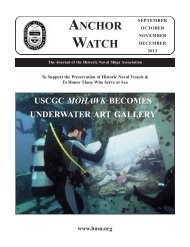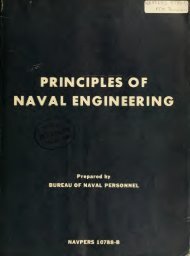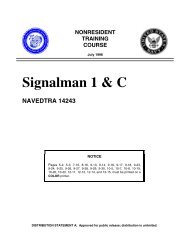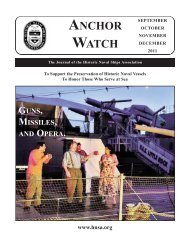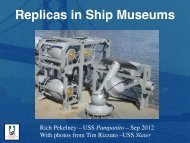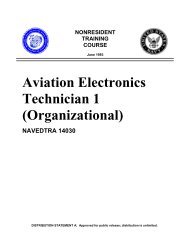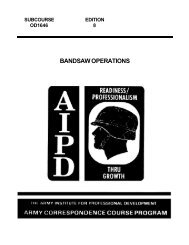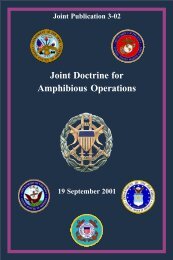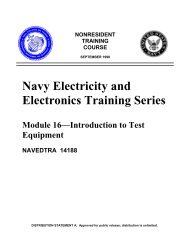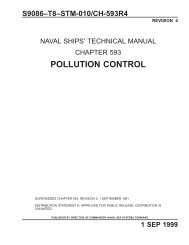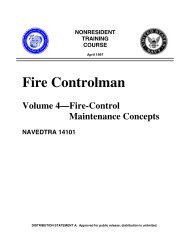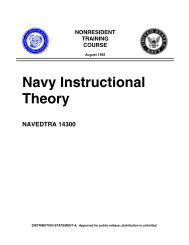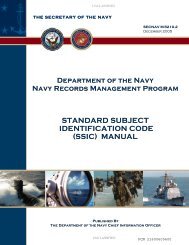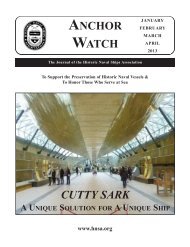- Page 1:
NWP 4-01.4NAVAL WARFARE PUBLICATION
- Page 10 and 11:
NWP 4-01.4PageNo.3.7.4 Fueling Coup
- Page 12 and 13:
NWP 4-01.4PageNo.4.17 REFERENCES ..
- Page 14 and 15:
NWP 4-01.4PageNo.6.9.5 Emergency Br
- Page 16 and 17:
NWP 4-01.4PageNo.8.3 PREPARING SHIP
- Page 18 and 19:
NWP 4-01.4PageNo.10.9 CARGO STAGING
- Page 20 and 21:
NWP 4-01.4E.6.3 Reports ...........
- Page 22 and 23:
NWP 4-01.4LIST OF ILLUSTRATIONSPage
- Page 24 and 25:
NWP 4-01.4PageNo.Figure 5-9. Easing
- Page 26 and 27:
NWP 4-01.4PageNo.Figure 8-6. Typica
- Page 29 and 30:
NWP 4-01.4RECORD OF CHANGESChange N
- Page 31 and 32:
NWP 4-01.4LIST OF ACRONYMS/ABBREVIA
- Page 33 and 34:
NWP 4-01.4PREFACEThe information co
- Page 35 and 36:
NWP 4-01.4FM ORIGINATORTO COMLOGGRU
- Page 37 and 38:
NWP 4-01.4CHAPTER 1Concepts of Repl
- Page 39 and 40:
NWP 4-01.4The replenishment capabil
- Page 41 and 42:
NWP 4-01.4small units to the lee si
- Page 43 and 44:
1-7 ORIGINALFigure 1-3. Developing
- Page 45:
STATIONPRODUCTAOETotal Time: 5 hrs.
- Page 48 and 49:
NWP 4-01.41. Attaining and maintain
- Page 50 and 51:
NWP 4-01.4COURSE TO PERMIT FLIGHTOP
- Page 52 and 53:
1234562-6 ORIGINALFigure 2-2. Flag
- Page 54 and 55:
NWP 4-01.43. When ships are yawing
- Page 56 and 57:
NWP 4-01.4a. The conning officer of
- Page 58 and 59:
NWP 4-01.4TRANSFER HEADSLACK WIRE R
- Page 60 and 61:
NWP 4-01.44. Retrieve rigs in accor
- Page 62 and 63:
NWP 4-01.4TYPE IVA, CLASS 2SCREW-PI
- Page 64 and 65:
NWP 4-01.4METHOD OF SENDING SHOTLIN
- Page 66 and 67:
NWP 4-01.41-1/8 INCH (28.5 mm) CRCM
- Page 68 and 69:
a. DAYGREENREDYELLOWWHITEGREENYELLO
- Page 70 and 71:
NWP 4-01.44. The control ship unsna
- Page 72 and 73:
NWP 4-01.4ITEM KEY QUANTITYALLEN WR
- Page 74 and 75:
NWP 4-01.4SIGNALRomeoDisplayed onfo
- Page 76 and 77:
NWP 4-01.45. Seeing that all attach
- Page 78 and 79:
NWP 4-01.4c. No. 1 (retrieving) sad
- Page 80 and 81:
NWP 4-01.41. A minimum of 150 watts
- Page 82 and 83:
NWP 4-01.42.6.7 Rig Loads. Loads on
- Page 84 and 85:
NWP 4-01.43. Anticipated schedule o
- Page 86 and 87:
NWP 4-01.4RIG APPLICATIONFUEL SPAN
- Page 88 and 89:
NWP 4-01.42. Cigarette lighters and
- Page 90 and 91:
NWP 4-01.4Most containers of inflam
- Page 93 and 94:
NWP 4-01.4CHAPTER 3Liquid Cargo Tra
- Page 95 and 96:
NWP 4-01.4AOE-1AOE-6416321854310651
- Page 97 and 98:
NWP 4-01.41. Spanwire attachment po
- Page 99 and 100:
NWP 4-01.43.7.3.1.2 2-1/2 Inch (63.
- Page 101 and 102:
NWP 4-01.4TROLLEY CARRIAGEMESSENGER
- Page 103 and 104:
3-11 ORIGINALFigure 3-7. Delivering
- Page 105 and 106:
112ATTACH END OF SPANWIRE TO CONVEN
- Page 107 and 108:
NWP 4-01.4VALVEGASKETSPRING-TENSION
- Page 109 and 110:
NWP 4-01.4Figure 3-13. Type D-2 Noz
- Page 111 and 112:
NWP 4-01.43.7.6 Miscellaneous Fitti
- Page 113 and 114:
NWP 4-01.4NOSE SHIELDPROBE20"(508.0
- Page 115 and 116:
NWP 4-01.4Figure 3-18. Fuel STREAM
- Page 117 and 118:
NWP 4-01.4FLOW-THRU SADDLETYPE (B)S
- Page 119 and 120:
NWP 4-01.4INBOARD SADDLE WHIPONE LI
- Page 121 and 122:
NWP 4-01.4SPANWIREMESSENGERATTACHME
- Page 123 and 124:
NWP 4-01.4STAR MESSENGER5/8" (15.8
- Page 125 and 126:
NWP 4-01.4NoteA remating line must
- Page 127 and 128:
NWP 4-01.4trolley carriage for use
- Page 129 and 130:
NWP 4-01.43.10.7 2-1/2-Inch (63.5 m
- Page 131 and 132:
NWP 4-01.4Figure 3-29. Double-Hose
- Page 133 and 134:
NWP 4-01.4(1) DELIVERY SHIP1. Posit
- Page 135 and 136:
NWP 4-01.4(4) DELIVERY SHIPHaul in
- Page 137 and 138:
NWP 4-01.43.13 CASUALTY CONTROLIf s
- Page 139 and 140:
NWP 4-01.4FUEL STREAM RIGEQUIPMENT*
- Page 141 and 142:
NWP 4-01.4FUEL STREAM RIGEQUIPMENT*
- Page 143:
NWP 4-01.4FUEL STREAM RIGEQUIPMENT*
- Page 146 and 147:
NWP 4-01.4WIRESADDLEWHIP#3ANTITOPPL
- Page 148 and 149:
NWP 4-01.4(2) RECEIVING SHIP1. Rece
- Page 150 and 151:
NWP 4-01.4d. Secure the coupling to
- Page 152 and 153:
NWP 4-01.4EQUIPMENTMATERIALLENGTH I
- Page 154 and 155:
NWP 4-01.44.10.5 Retrieving the Clo
- Page 156 and 157:
NWP 4-01.4TROLLEY NO. 4TROLLEY NO.
- Page 158 and 159:
NWP 4-01.417. Shackle saddle whip a
- Page 160 and 161:
NWP 4-01.4FORWARDEASING OUT LINE1"
- Page 162 and 163:
NWP 4-01.44.11.2.4.2 Receiving Ship
- Page 164 and 165:
NWP 4-01.4ROPE PENDANTFWDFUEL ORWAT
- Page 166 and 167:
NWP 4-01.44.17 REFERENCESATP 16, Re
- Page 168 and 169:
NWP 4-01.4NONTENSIONEDSPANWIRE RIGC
- Page 170 and 171:
NWP 4-01.4NONTENSIONEDSPANWIRE RIGC
- Page 172 and 173:
NWP 4-01.4NONTENSIONEDSPANWIRE RIGC
- Page 174 and 175:
NWP 4-01.45.6.4 Fueling Couplings.
- Page 176 and 177:
NWP 4-01.4SIGNALMEANINGDAY NIGHT RE
- Page 178 and 179:
NWP 4-01.4RING GEAR (DRIVENBY GEARB
- Page 180 and 181:
NWP 4-01.4SECURING ADAPTER CLAMP2'-
- Page 182 and 183:
5-10 ORIGINALFigure 5-7. Float Asse
- Page 184 and 185:
HOSE EASING-OUT LINE2-1/2" (63.5 mm
- Page 186 and 187:
NWP 4-01.4LEGENDNO.DESCRIPTIONHOSE
- Page 188 and 189:
DETAIL: MODIFIED BREAKABLE SPOOL AT
- Page 190 and 191:
5-18 ORIGINALFigure 5-12. Delivery
- Page 192 and 193:
NWP 4-01.4MESSENGERFAIRLEAD BLOCK12
- Page 194 and 195:
MESSENGER TO CLEATNWP 4-01.4PEAR-SH
- Page 196 and 197:
NWP 4-01.4EASING-OUT LINE2. Upon re
- Page 198 and 199:
NWP 4-01.4HOSE AND 3-1/2" (88.9 mm)
- Page 200 and 201:
NWP 4-01.4400' (121.9 m) 1-1/2" (38
- Page 202 and 203:
NWP 4-01.4ITEM NOMENCLATURE QUANTIT
- Page 204 and 205:
1" (25.4 mm) PELICAN HOOKTENSIONED
- Page 206 and 207:
NWP 4-01.42. One reserve radio tran
- Page 208 and 209:
NWP 4-01.410. Attaches the riding l
- Page 210 and 211:
NWP 4-01.45.8.9.1 MSC 4020-4 Discha
- Page 212 and 213:
NWP 4-01.45.9 REFERENCESATP 16, Rep
- Page 214 and 215:
Tanker(MS/SS)RadioCallSignDWT (2) L
- Page 216 and 217:
NWP 4-01.4DECK DEPARTMENT1. Purge a
- Page 219 and 220:
NWP 4-01.4CHAPTER 6Solid Cargo Tran
- Page 221 and 222:
NWP 4-01.4transfer, when no other a
- Page 223 and 224:
NWP 4-01.46.3.5 Transfer of Ammunit
- Page 225 and 226:
NWP 4-01.47. If the receiving ship
- Page 227 and 228:
NWP 4-01.4position and remains exte
- Page 229 and 230:
NWP 4-01.4(see Figure 6-5). When us
- Page 231 and 232:
NWP 4-01.4KINGPOST (M-FRAME TYPE SH
- Page 233 and 234:
NWP 4-01.4OUTHAUL(TENSIONED)STREAMT
- Page 235 and 236:
NWP 4-01.4(a)POSITIVE LOCK CHAIN(b)
- Page 237 and 238:
NWP 4-01.4SINGLE-PALLET LOADSUSE EI
- Page 239 and 240:
NWP 4-01.4TRAVELINGSURFSTAR LATCH A
- Page 241 and 242:
NWP 4-01.4STREAM rigs in order of p
- Page 243 and 244:
NWP 4-01.4OUTHAULSTAR LATCHASSEMBLY
- Page 245 and 246:
NWP 4-01.4PUSH STAR LATCHES INBOARD
- Page 247 and 248:
NWP 4-01.4TWO STOPS ARE ATTACHED 35
- Page 249 and 250:
NWP 4-01.4SURFSTAR LATCH ASSEMBLYST
- Page 251 and 252:
NWP 4-01.4(3) DELIVERY SHIPThe SURF
- Page 253 and 254:
NWP 4-01.4TWO STOPS ARE ATTACHED 35
- Page 255 and 256:
NWP 4-01.49. Ensure that all necess
- Page 257 and 258:
NWP 4-01.4transfer head. Inhaul win
- Page 259 and 260:
NWP 4-01.4RAM TENSIONERTENSIONED HI
- Page 261 and 262:
NWP 4-01.43. After the easing-out l
- Page 263 and 264:
NWP 4-01.4NoteThe receiving station
- Page 265 and 266:
NWP 4-01.4MK II5,700 (2,584 KG) CAP
- Page 267 and 268:
NWP 4-01.4FIXED PADEYEORPENDANTTENS
- Page 269 and 270:
NWP 4-01.412. When slings are engag
- Page 271 and 272:
NWP 4-01.4a.OUTHAULTENSIONEDHIGHLIN
- Page 273 and 274:
NWP 4-01.45. Position the return lo
- Page 275 and 276:
NWP 4-01.4STREAM rigs are capable o
- Page 277 and 278:
NWP 4-01.4MK 6 STRONGBACK+ +(GULLWI
- Page 279 and 280:
NWP 4-01.4STREAM Rigs for All Ships
- Page 281:
NWP 4-01.4STREAM Rigs for All Ships
- Page 284 and 285:
NWP 4-01.4NONTENSIONEDRIG (Note 1)D
- Page 286 and 287:
1.0W1.0W1.0W1.0WNWP 4-01.41.07WPROP
- Page 288 and 289:
ALL PREVENTERS ANDGUYS ARE NOT SHOW
- Page 290 and 291:
NWP 4-01.44. Fake down the rig mess
- Page 292 and 293:
NWP 4-01.4PREFERRED RIGACCEPTABLE R
- Page 294 and 295:
NWP 4-01.45. Adjust the wire, so th
- Page 296 and 297:
NWP 4-01.4station, passing the line
- Page 298 and 299:
NWP 4-01.4BURTON RIGDELIVERY SHIPEQ
- Page 300 and 301:
NWP 4-01.4BURTON RIGRECEIVING SHIPE
- Page 303 and 304:
NWP 4-01.4CHAPTER 8Personnel Transf
- Page 305 and 306: NWP 4-01.4STREAMTROLLEYHIGHLINESTOP
- Page 307 and 308: NWP 4-01.4STREAM TROLLEYCARGODROP R
- Page 309 and 310: NWP 4-01.42. Attach the inhaul to t
- Page 311 and 312: NWP 4-01.4NoteCoil the easing-out l
- Page 313 and 314: NWP 4-01.46. Signal the delivery st
- Page 315 and 316: NWP 4-01.4NoteDo not install the tr
- Page 317 and 318: NWP 4-01.4CHAPTER 9Personnel, Light
- Page 319 and 320: NWP 4-01.4FOR TRANSFER CHAIRLINK AN
- Page 321 and 322: 14"(355.6 mm)9-5 ORIGINALFigure 9-3
- Page 323 and 324: NWP 4-01.4Transfer personnel intern
- Page 325 and 326: NWP 4-01.4DELIVERY SHIP EQUIPMENT C
- Page 327 and 328: NWP 4-01.4CHAPTER 10Vertical Replen
- Page 329 and 330: NWP 4-01.4CARRIERS/AIR CAPABLE SHIP
- Page 331 and 332: NWP 4-01.410.2.2.3 Ship-Produced In
- Page 333 and 334: NWP 4-01.410.5.3 Forklift Trucks. F
- Page 335 and 336: NWP 4-01.4HOISTING SLING MK 105WITH
- Page 337 and 338: NWP 4-01.4UPPER EYE (ENCASED IN POL
- Page 339 and 340: NWP 4-01.410.6 VERTREP PREPARATIONS
- Page 341 and 342: NWP 4-01.4CBCADBSTEP 2STEP 1DDABCST
- Page 343 and 344: NWP 4-01.4LATCHLOCKSWAGED STOPBAILD
- Page 345 and 346: NWP 4-01.41. TO OPEN HOOK — Grasp
- Page 347 and 348: NWP 4-01.4NoteSteadying line is ten
- Page 349 and 350: NWP 4-01.4H-46VERTREPLINE4' (1.21 M
- Page 351 and 352: NWP 4-01.4WARNINGIn the case of the
- Page 353 and 354: NWP 4-01.4WARNINGWhen making up ret
- Page 355: NWP 4-01.410.11 NIGHT VERTREPShips
- Page 359 and 360: NWP 4-01.42. After landing, the air
- Page 361 and 362: NWP 4-01.410.16.5.2 Communications.
- Page 363: NWP 4-01.45. Personnel being caught
- Page 366 and 367: NWP 4-01.4SAFETYGRAM(Mark X in appr
- Page 368 and 369: NWP 4-01.4WARNINGContains phosphate
- Page 370 and 371: NWP 4-01.4-4,000(1,814)RECEIVING SH
- Page 373 and 374: NWP 4-01.4APPENDIX CReplenishment O
- Page 375 and 376: NWP 4-01.4STANDARD PROCEDURES (Para
- Page 377 and 378: NWP 4-01.4STANDARD PROCEDURES (Para
- Page 379 and 380: NWP 4-01.4EMERGENCY BREAKAWAY (Para
- Page 381: NWP 4-01.4APPENDIX DReplenishment C
- Page 384 and 385: NWP 4-01.4REPLENISHMENT CHECKLISTEn
- Page 386 and 387: NWP 4-01.4REPLENISHMENT CHECKLISTNi
- Page 388 and 389: NWP 4-01.4REPLENISHMENT CHECKLISTFu
- Page 390 and 391: NWP 4-01.4REPLENISHMENT CHECKLISTST
- Page 392 and 393: NWP 4-01.4REPLENISHMENT CHECKLISTFu
- Page 394 and 395: NWP 4-01.4REPLENISHMENT CHECKLISTSy
- Page 396 and 397: NWP 4-01.419. Replenishment complet
- Page 398 and 399: NWP 4-01.4E.4 ADMINISTRATIVE PROCED
- Page 400 and 401: NWP 4-01.4as to risk hazard to the
- Page 402 and 403: NWP 4-01.4— spelled out — and t
- Page 405 and 406: NWP 4-01.4APPENDIX GReplenishment R
- Page 407 and 408:
NWP 4-01.4APPENDIX HMetric Weights
- Page 409:
NWP 4-01.4LENGTHinches x 25.4 = mmi
- Page 413 and 414:
NWP 4-01.4APPENDIX JAstern FAS Hose
- Page 415 and 416:
NWP 4-01.4PARTS LISTPART NO.DESCRIP
- Page 417 and 418:
NWP 4-01.43. Place hose crimper (6)
- Page 419 and 420:
NWP 4-01.4OPERATING INSTRUCTIONS FO
- Page 421 and 422:
NWP 4-01.4APPENDIX KStation-Keeping
- Page 423 and 424:
NWP 4-01.4APPENDIX LPotable Water T
- Page 425 and 426:
NWP 4-01.4INDEXAPageNo.Abnormal ope
- Page 427 and 428:
NWP 4-01.4Streaming the lay-on-deck
- Page 429 and 430:
NWP 4-01.4Hoists, signal flag .....
- Page 431 and 432:
NWP 4-01.4Oil spill prevention ....
- Page 433 and 434:
NWP 4-01.4PageNo.STREAM support leg
- Page 435 and 436:
NWP 4-01.4PageNo.Staging:Cargo ....
- Page 437:
NWP 4-01.4LIST OF EFFECTIVE PAGESEf



